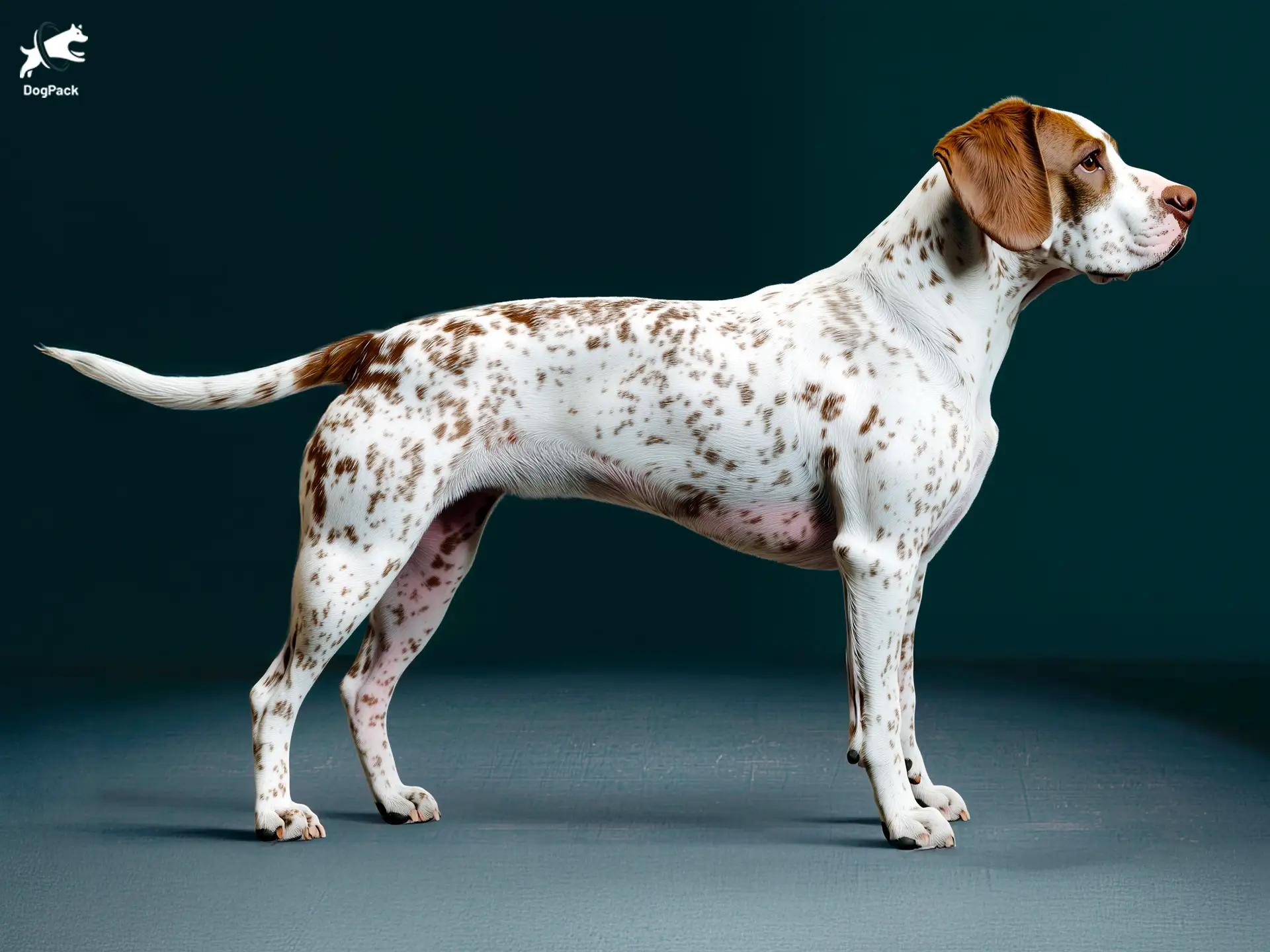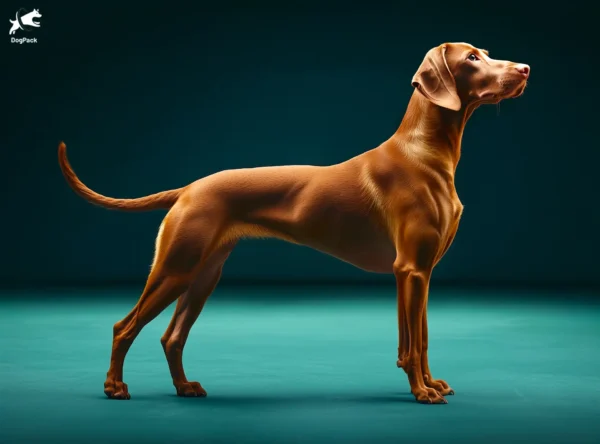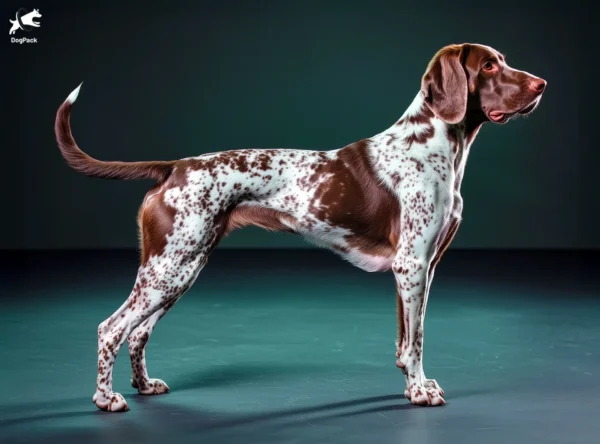Braque du Bourbonnais Dog Breed Info & Overview
The Braque du Bourbonnais, a rare French hunting dog, is admired for its unique speckled coat and affectionate temperament. This medium-sized breed excels in both agility and intelligence, making it a skilled hunter and a loving family companion. With its combination of field prowess and gentle nature, the Braque du Bourbonnais stands out as a versatile and devoted breed.
Characteristics
Pictures
Breed History
The Braque du Bourbonnais hails from the Bourbonnais region of France, dating back to the 16th century. Originally bred for bird hunting, this breed was prized for its keen sense of smell and close-working style. After near extinction post-World War II, dedicated enthusiasts revived the breed, preserving its unique characteristics and hunting prowess.
Their name reflects their geographic roots—”Braque” meaning “pointing dog” in French and “Bourbonnais” indicating their region of origin. This breed was known among French nobility and rural hunters alike, valued for both their skills and companionship. The Braque du Bourbonnais remains relatively rare outside France but has gained recognition among hunting enthusiasts worldwide.
The breed’s resurgence is a testament to its enduring appeal. Breeders focused on maintaining the dog’s traditional features, including its distinctive short tail and speckled coat. Today, the Braque du Bourbonnais continues to excel in hunting and has found a place in the hearts of families seeking an active, loving companion.
Temperament, Personality
Braque du Bourbonnais dogs are known for their affectionate and loyal nature. They form strong bonds with their families and thrive on human interaction. Intelligent and eager to please, they respond well to positive reinforcement during training sessions.
While they are gentle with family members, including children, their high energy levels mean they can be a bit exuberant. Early socialization helps them interact well with strangers and other animals. As natural hunters, they may have a strong prey drive, so supervision around smaller pets is advisable.
Their sensitive disposition means they don’t respond well to harsh training methods. Patience and consistency are key when working with a Braque du Bourbonnais. Their intuitive nature makes them attuned to their owner’s emotions, adding to their role as a compassionate companion.
Physical Characteristics
The Braque du Bourbonnais is a medium-sized dog with a robust and muscular build. One of its most distinctive features is its short, sometimes naturally docked tail. The breed sports a short coat with a unique speckled pattern, often in shades of liver or fawn.
Their expressive eyes are usually hazel or amber, complementing their coat colors. The ears are medium-sized and set high, hanging close to the head. The overall appearance is one of elegance combined with strength, reflecting their capabilities in the field.
Their compact size doesn’t hinder their agility. The Braque du Bourbonnais has a well-proportioned body that allows for swift movement and endurance, essential traits for a hunting dog. Their physical attributes make them both aesthetically pleasing and functionally adept.
Health Issues
While generally a healthy breed, the Braque du Bourbonnais can be prone to certain genetic health issues. Hip dysplasia is one concern, a condition where the hip joint doesn’t develop properly. Regular veterinary check-ups and screenings can help in early detection and management.
Another potential issue is elbow dysplasia, which can affect their mobility. The breed may also be susceptible to certain skin conditions due to their short coat. Keeping up with vaccinations and parasite prevention is crucial for their overall health.
It’s important to obtain a Braque du Bourbonnais from a reputable breeder who conducts health tests on their breeding stock. This practice reduces the risk of inheriting genetic conditions. Regular exercise and a balanced diet also contribute to a long, healthy life for these dogs.
Grooming Needs
The Braque du Bourbonnais has low to moderate grooming needs, thanks to its short coat. Regular brushing once a week is sufficient to remove loose hairs and keep the coat looking its best. During shedding seasons, more frequent brushing may help manage the extra hair.
Bathing is needed only occasionally or when the dog gets particularly dirty. Their ears should be checked regularly for signs of infection, especially if they spend a lot of time outdoors. Nail trimming should be done monthly to prevent overgrowth and discomfort.
Dental hygiene is also important. Brushing the Braque du Bourbonnais’s teeth several times a week helps prevent tartar build-up and gum disease. Overall, their grooming routine is manageable and can be a great way to bond with your pet.
Exercise Requirements
High energy levels mean the Braque du Bourbonnais requires ample daily exercise. At least 1–2 hours of physical activity is recommended to keep them mentally and physically stimulated. Activities can include long walks, jogging, hiking, or interactive games like fetch.
Given their hunting background, they excel in field trials and can be trained for various dog sports such as agility or obedience competitions. Mental stimulation is just as important; puzzle toys and scent-tracking games can keep their intelligent minds engaged.
Without sufficient exercise, the Braque du Bourbonnais may become bored and exhibit undesirable behaviors like chewing or digging. They’re not well-suited for apartment living unless the owner is exceptionally active and committed to meeting their exercise needs.
Training Tips
Training a Braque du Bourbonnais can be a rewarding experience due to their intelligence and eagerness to please. Positive reinforcement methods work best, using treats and praise to motivate them. Consistency is key, as they can be sensitive to harsh corrections.
Early socialization is important to help them become well-adjusted adults. Exposing them to various environments, people, and other animals will enhance their adaptability. Given their hunting instincts, recall training is essential to ensure they return when off-leash.
Obedience classes can provide structure and help address any stubborn tendencies. The Braque du Bourbonnais responds well to challenges that engage both their mind and body, so incorporating advanced training or dog sports can be beneficial.
Nutrition, Diet
Feeding a Braque du Bourbonnais requires attention to their active lifestyle. A high-quality dog food formulated for medium-sized, energetic breeds is recommended. They typically require about 2.5 to 3 cups of dry food per day, split into two meals.
Protein-rich diets support their muscle development and energy needs. Including omega fatty acids can promote a healthy coat and skin. Always ensure fresh water is available, especially after exercise sessions.
Be cautious with treats to prevent overfeeding, which can lead to obesity—a risk factor for joint issues like hip dysplasia. Consult your veterinarian to tailor a diet plan that suits your Braque du Bourbonnais’s specific needs and activity level.
Adoption, Breeders
If you’re considering adding a Braque du Bourbonnais to your family, it’s crucial to seek out reputable breeders. Organizations like the Braque du Bourbonnais Club of America provide resources for finding responsible breeders who prioritize health and temperament.
Adoption is also an option, though this breed’s rarity makes it less common in shelters. Checking with breed-specific rescue organizations can be fruitful. Ensure that any breeder you consider follows ethical practices, including health screenings for genetic conditions.
Visiting the breeder to meet the puppies and parent dogs can provide insight into the dog’s future temperament. Avoid purchasing from puppy mills or pet stores where the breeding conditions are unknown.
Family Pet?
The Braque du Bourbonnais can make an excellent family pet for the right household. Their affectionate and gentle nature endears them to family members, including older children who can handle their energetic play style. They thrive on companionship and are happiest when included in family activities.
However, their high energy levels mean they need plenty of exercise to be content. Families that enjoy outdoor activities like hiking or running will find a great match in this breed. Supervision around smaller pets is advisable due to their hunting instincts.
Their intuitive nature makes them responsive to family dynamics, often acting as a comforting presence. With proper training and socialization, the Braque du Bourbonnais can be a loving and loyal addition to an active family.
Right For You?
Deciding if the Braque du Bourbonnais is right for you depends on your lifestyle. If you’re an active individual or family who enjoys outdoor activities, this breed could be a perfect fit. They require time, attention, and plenty of exercise to thrive.
First-time dog owners might find them manageable due to their trainable nature, but should be prepared for their energy levels. They may not be ideal for apartment living unless daily exercise needs are met. Consider your ability to commit to their physical and mental stimulation.
Their affectionate personality means they don’t like being left alone for long periods. If you have the time and energy to invest, the Braque du Bourbonnais can reward you with unwavering loyalty and companionship.
Conclusion
The Braque du Bourbonnais is a rare gem among dog breeds, offering a blend of hunting prowess and affectionate companionship. Their unique history and distinctive appearance make them stand out, but it’s their loving nature that truly captures hearts. If you’re seeking an active, intelligent, and loyal companion, the Braque du Bourbonnais might just be the perfect match for you.
FAQs
-
What is the Braque du Bourbonnais’s coat like?
The Braque du Bourbonnais has a short, dense coat with a unique speckled pattern in liver or fawn colors. This low-maintenance coat requires minimal grooming.
-
Is the Braque du Bourbonnais good with other dogs?
Yes, with proper socialization, the Braque du Bourbonnais gets along well with other dogs. Early exposure helps them develop good canine manners.
-
How rare is the Braque du Bourbonnais?
The Braque du Bourbonnais is considered a rare breed, especially outside of France. Dedicated breeding programs have helped increase their numbers.
-
Does the Braque du Bourbonnais have a strong prey drive?
Yes, due to their hunting background, they have a strong prey drive. Care should be taken around smaller animals, and recall training is essential.
-
What activities are best for a Braque du Bourbonnais?
They excel in activities that engage both mind and body, such as hunting trials, agility courses, and obedience training. Regular exercise is crucial.
Breed Ratings
The Braque du Bourbonnais is smart and quick to learn, making training a rewarding experience.
They have a playful nature that endears them to families and keeps them young at heart.
High energy levels require ample daily exercise to keep them satisfied and well-behaved.
Moderate shedding occurs, especially during seasonal changes; regular brushing helps manage it.
A strong prey drive is inherent due to their hunting heritage; caution is advised around small pets.
Their short coat is easy to maintain with minimal grooming required.
Eager to please and intelligent, they respond well to positive reinforcement techniques.
They prefer companionship and may experience separation anxiety if left alone too long.
Moderate barkers, they may vocalize when excited or alerting to something unusual.
Generally not heavy droolers, making them easier to live with indoors.
With proper socialization, they are friendly towards other dogs and enjoy canine company.
Generally healthy but watch for genetic conditions; regular vet care keeps them in top shape.














